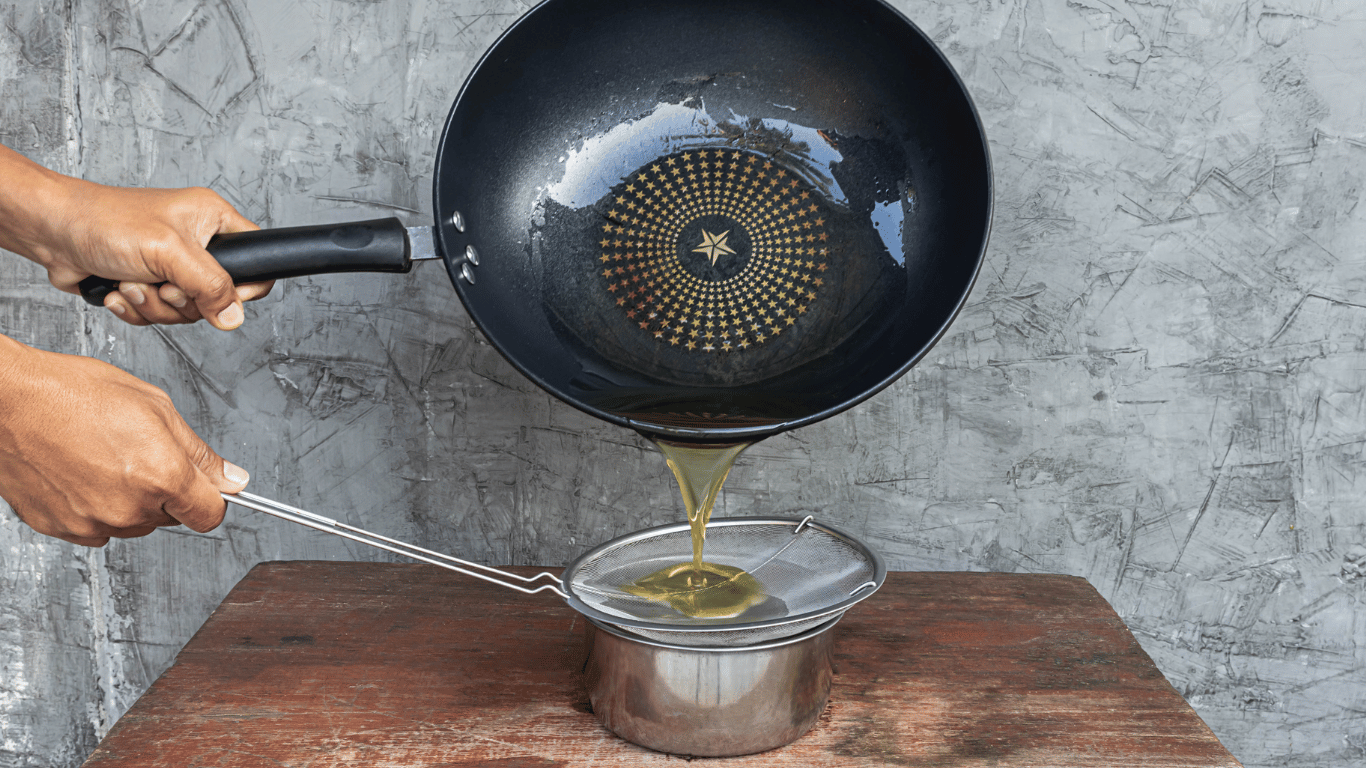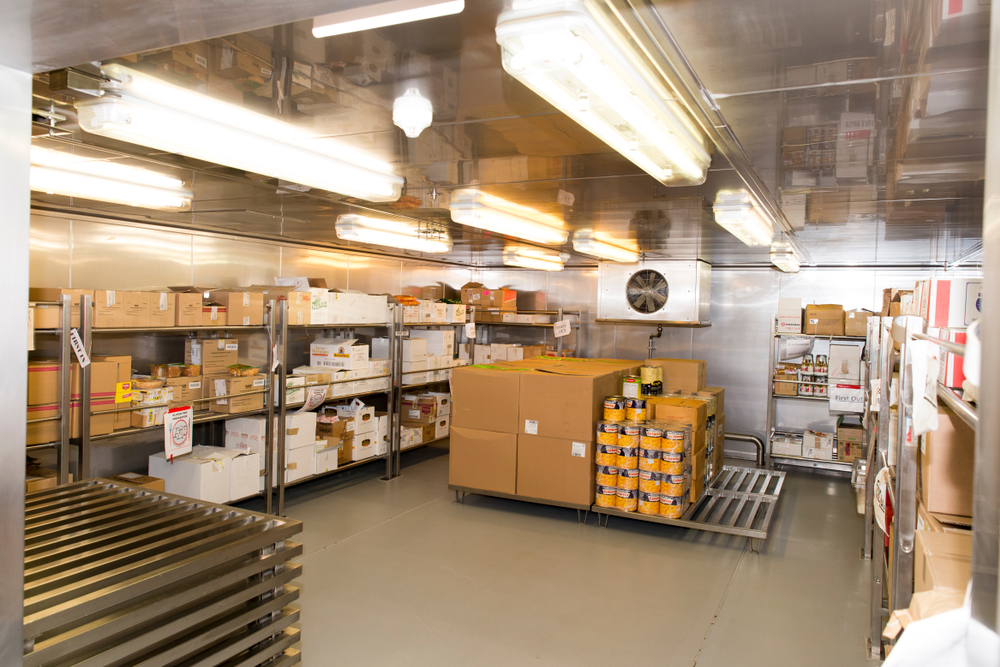Properly cleaning cooking oil after frying is crucial for maintaining kitchen hygiene, ensuring food safety, making your cooking oil last longer, and extending the life of your frying equipment. This process might seem mundane, but it’s a vital step in any commercial kitchen operation. Here’s a comprehensive guide on how to clean used cooking oil from Frymax, the UK’s leading supplier of sustainable palm oil.
Importance of Properly Cleaning Cooking Oil
Neglect to clean cooking oil after frying can lead to a host of problems. Firstly, it compromises food safety. Residual food particles in the oil can create an environment for bacteria to thrive, potentially contaminating future batches of food.
Secondly, dirty oil affects the quality of your food. As oil is used repeatedly, it breaks down and becomes laden with food particles. This deterioration impacts the taste and texture of your fried products, leading to customer dissatisfaction.
Finally, unclean oil damages your frying equipment. A buildup of food particles and debris can clog filters, reduce the efficiency of your fryer, and even cause equipment failure. Regular cleaning prolongs the lifespan of your equipment, saving you money in the long run.
Tools and Materials Needed
To effectively clean cooking oil, you’ll need the following:
- Large, heat-resistant containers
- Paper towels or absorbent cloths
- Fine-mesh sieves or filters
- Detergent (specifically designed for oil cleaning)
- Degreaser
- Rubber gloves
- Safety goggles
How to Clean Cooking Oil After Frying
- Allow Oil to Cool: Before handling the hot oil, let it cool down significantly. This prevents burns and makes the cleaning process safer.
- Strain the Oil: Use a fine-mesh sieve or filter to remove large food particles and debris from the oil. This initial filtration helps prolong the oil’s life.
- Transfer to Storage Container: Carefully transfer the strained oil to a clean, heat-resistant container. Ensure the container is airtight to prevent contamination.
- Filter Again: For optimal results, consider filtering the oil again after it has cooled completely. This removes finer particles and extends its usable life.
- Store Properly: Store the filtered oil in a cool, dark place. Avoid exposing it to light and heat, as these factors can accelerate oil degradation.
Cleaning Up Cooking Oil Spills
Cooking oil spills can be hazardous and slippery. Here’s how to handle them:
- Safety First: Wear gloves and safety goggles to protect yourself from burns and oil contact.
- Absorb the Spill: Use paper towels or absorbent materials to soak up the spilled oil. Avoid spreading the oil by wiping it aggressively.
- Degreaser Application: Apply a degreaser to the remaining oil residue and let it sit for a few minutes.
- Hot Water and Detergent: Clean the area with hot water and detergent, using a scrubbing pad if necessary.
- Dry Thoroughly: Ensure the area is completely dry to prevent slipping hazards.
Disposal of Used Cooking Oil
Proper disposal of used cooking oil is essential for environmental protection. Avoid pouring oil down the drain, as it can cause blockages, contaminate water sources, and lead to costly plumbing issues.
Legal Framework
The disposal of used cooking oil in the UK is subject to strict regulations. Businesses handling cooking oil are required to adhere to the Environmental Protection Act 1990, the Food Safety Act 1990, and the Controlled Waste Regulations 2012. Non-compliance can result in significant penalties, including fines and even business closure.
Recycling Used Cooking Oil
Recycling used cooking oil is an environmentally friendly and often profitable option. Many companies collect used cooking oil and convert it into biodiesel, a renewable fuel. Some oils can also be refined for use in other products.
Types of Oil Suitable for Recycling
Most cooking oils, including vegetable, sunflower, rapeseed, and palm oil, can be recycled. However, oils heavily contaminated with food particles or chemicals may not be suitable.
The Recycling Process
Used cooking oil undergoes a rigorous recycling process. It is collected, transported, and processed in specialised facilities. The oil is filtered, cleaned, and purified to remove impurities. The resulting product can be used as a base for biodiesel or other industrial applications.
Collection and Disposal Services
Numerous companies offer used cooking oil collection services. These services provide secure containers and arrange for regular pickups. It’s essential to choose a reputable company that is licensed to handle waste oil.
Tips for Preventing Cooking Oil Spills
Preventing cooking oil spills is crucial for maintaining a safe and efficient kitchen environment. By implementing these tips, you can significantly reduce the risk of accidents and the time spent cleaning up messes.
- Overfill Prevention: Always adhere to the maximum oil level indicators on your fryer. Overfilling can lead to spills when food is added or when the oil heats up.
- Careful Handling: Exercise caution when transferring hot oil. Use appropriate tools and containers designed for handling hot liquids. Avoid sudden movements that could cause spills.
- Lid Preparedness: Keep a lid specifically for your fryer nearby. If a small fire starts, quickly covering the fryer with the lid can extinguish the flames without creating a mess.
- Non-Slip Mats: Using non-slip mats in your kitchen provides added stability for equipment and personnel. This reduces the risk of accidental bumps and spills.
- Regular Fryer Maintenance: Consistent maintenance is vital. Check for leaks, worn seals, and other issues that could lead to oil spills. Clean the fryer regularly to prevent buildup that can cause malfunctions.
- Employee Training: Ensure all staff members are trained in proper oil handling procedures. This includes techniques for safe oil transfer, storage, and disposal.
- Spill Containment: Place absorbent pads or trays under fryers to catch minor drips and spills. This helps prevent oil from spreading and makes cleanup easier.
- Cleanliness is Key: A clean kitchen environment reduces the risk of accidents. Spills are more likely to occur in cluttered areas.
- Emergency Preparedness: Have a spill cleanup kit readily available, including absorbent materials, gloves, and cleaning supplies. This allows for a quick and efficient response.
- Avoid Distractions: Minimise distractions while cooking. Focus on the task at hand to prevent accidental spills and burns.
By incorporating these preventive measures into your kitchen operations, you can create a safer and more efficient workspace while reducing the potential for costly and time-consuming cleanup.
Frymax – Your Sustainable Palm Oil Supplier in the UK
Discover the choice of culinary experts for over 70 years – Frymax, the preferred cooking oil for fryers! As a leading supplier of deep fat fryer oil nationwide, we pride ourselves on delivering excellence. Frymax is the answer – a premium, 100% natural, and sustainable palm oil perfect for deep frying, with less than one percent trans fatty acids.
Our RSPO certified oils are not just pure but also free of additives, allergens, GM ingredients, and hydrogenated oils, catering to every kitchen’s needs. With a legacy of outstanding quality for six decades, we’ve earned the loyalty of customers spanning over a quarter-century.
For more details or to become a Frymax member, unlocking exclusive content, expert frying advice, and exciting competitions, contact us today!






